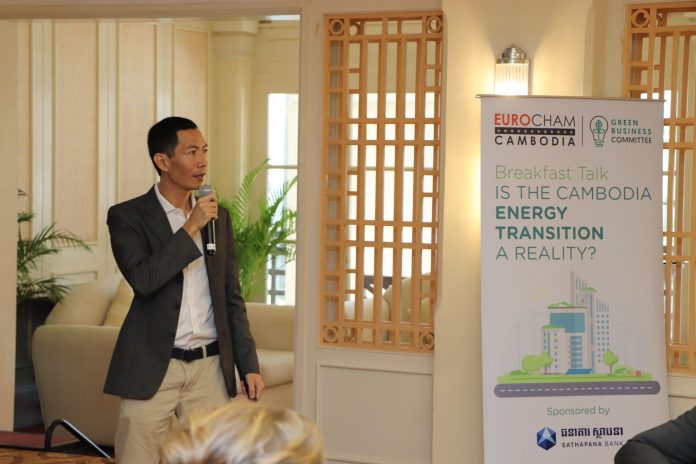Aaron Woolner
Cambodia has a ‘huge potential’ for expanding its solar energy sector as it looks to transition its energy mix away from fossil fuels, according to Natharoun Ngo Son, country director for Energy Lab, who was speaking at an event hosted by the European Chamber of Commerce (EuroCham).
The Cambodian government has committed to reaching carbon neutrality by 2050, an ambition which is made more challenging due to expected economic growth in the Kingdom, according to opening speaker Dr Sajith Edirisuriya.
Cambodia’s total energy demand is set to quintuple
Dr Sajith, who is Chairman of the EuroCham’s Green Business Committee, and General Manager at Chip Mong Insee Cement Corporation, estimated that power demand in Cambodia is set to quintuple by 2040 from current levels, meaning energy transition needs to occur as Cambodia increases power generation.
However, Mr Son highlighted the recent power development plan (PDP) set-out by the Cambodian government, and the rapid increase in the cost of coal power since 2019, as providing the push and pull factors needed to kickstart the country’s nascent solar sector as well as increasing power generation.

‘It’s much more expensive to produce electricity from coal power. And that’s the opportunity. Cambodia has a huge potential for solar energy.
Cambodia is capable of producing about 45GWs of power and currently it’s producing 450MWs – that’s not even 0.1% of total capacity. But this has to expand in order to meet the increasing electricity demands that Dr Sajith mentioned,” said Mr Son.
Cambodia to become a solar energy exporter
Cambodia recently signed a cooperation deal with Singapore to act as a transmission hub for green energy from Laos to the city state, and fellow panellist Morten Kvammen, from consultancy Misca Advisors, said this could presage the country becoming a solar energy exporter.
“The energy transition is real. There’s a long way to go in terms of developing all of the necessary capacity, but the fact is solar is cheaper power [than coal], and Cambodia has a great solar resource that can be developed efficiently and at a low cost”, he said.
Mr Kvammen said that while the Cambodian government was supportive of developing the domestic solar industry a number of hurdles remained, particularly the need to expand the power grid to meet rising demand for electric vehicles.

Despite these challenges he was bullish about Cambodia’s ability to meet its recently stated target to achieve 40% of energy production from solar by 2040, with the consultant saying that it was ‘irrelevant’, as the goal was likely to be met by 2030 at the latest.
“There’s a long way to go in terms of developing all of this capacity, but the government is committed to see that happen for a variety of reasons. For Cambodia, it’s a matter of having a grid that’s ready for a significant increase in electricity consumption.
And this is, to some extent, driven by what the government is currently doing. But it’s mainly coming from the private sector, because there are a number of electric vehicles that are already available in the market,” he said.
Is the transition moving fast enough?
Julien Chevillard, chief technical adviser at the The United Nations Development Programme in Cambodia said that attitudes among government officials to green energy had changed rapidly in recent years and there was a ‘lot of momentum’ in discussions with Minister of Economy and Finance, Public Works and Transport, and Energy with respect to renewables.

While this government support was welcomed by the panel, given the long time lines involving with setting up a solar energy projects, Dinah Kumar, Cambodia country director of Total Energies expressed concern whether the energy transition process is moving fast enough.
“There are frameworks that are being worked on and transition is possible. My question is the timing. Things are moving, but are we moving at the right pace?”





